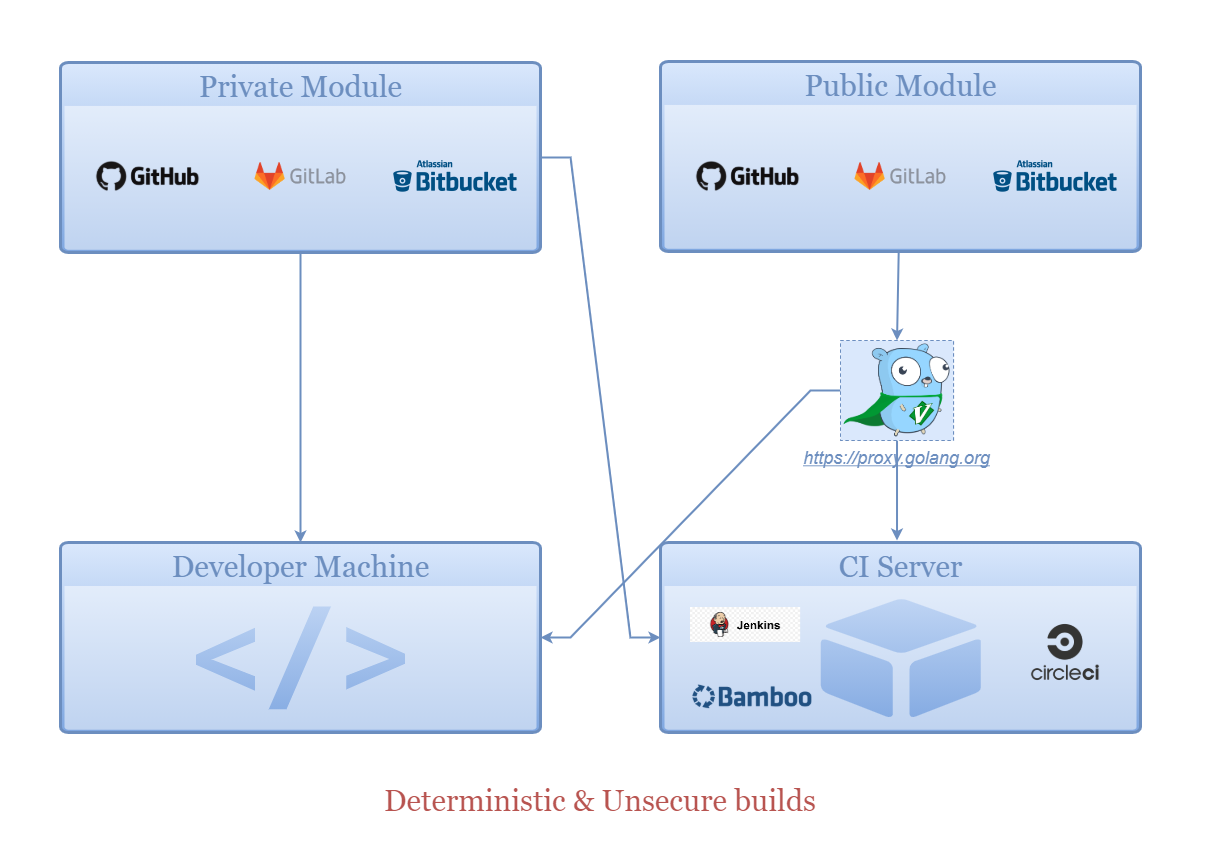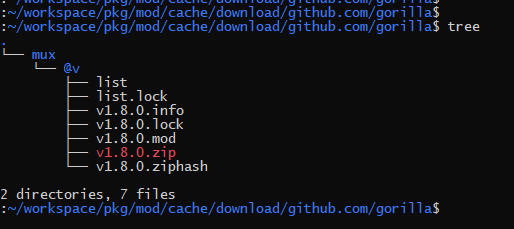In the last article Module - Future of package management in Golang, we discussed about dependency management in Golang and its adoption in the developer community. Unlike Maven in Java, module allows us to host local copies of public/private libraries to avoid any malicious code without knowledge.

GOPROXY and its benefits in the setting-up local
copies of public/private libraries. So that we can target following:
- Ensure version consistency
- Let public repositories get bugs out
- Let public repositories secure from unauthorized alterations
Why GOPROXY?
GitHub, Bitbucket, GitLabto download repositories before Golang came-up with the Go Module in 2018.
Issues With Direct Source
Third party dependencies are typically downloaded from the public server, where as all private dependencies needs VCS credentials. This approach has two potential problems with respect to fundamental requirements of a deterministic and secure build and development process immutability & availability.What if a module owner removes or updates a version, While these scenarios are considered to be bad practice, they do occur frequently.

Centralized Package Repository
GOPROXY for our Golang development or CI environment allows us to achieve centralized
package repository. As it redirects all download requests to a cache repository instead of
direct repository. In this way, we can always guarantee what a specific version of a module
contains, so our builds are always repeatable. This also helps ensure the module is
always available, even if the original in the VCS repo is destroyed or removed.
Public Centralized Repository
A public centralized repository available to Golang developers across the globe. It hosts open-source Go modules that have been made available from third parties in publicly accessible VCS project repositories. Most, like proxy.golang.org are provided to the Golang developer community for free.
Typically, Golang projects make use of both open-source and private module
dependencies. We can use the GOPRIVATE environment variable to specify a list of paths that
must bypass GOPROXY and GOSUMDB and download private modules directly from
those private VCS repositories.

We should set GOPROXY and GOPRIVATE environment variable to
proxy.golang.org and central.corp.com respectively in-order to
make use of public centralized and private repository.
$ export GOSUMDB="https://sum.golang.org/lookup/"
$ export GOPRIVATE=https://example.corp.com
Private Centralized Repository
A private centralized repository is one we install in the organization boundaries to store both public and private Go modules.

Public modules are cached locally in the binary repository manager like JFrog Artifactory, Athens, Go Proxy, and private modules are also cached in the centralized private repository from their VCS. In this way, immutability and availability can be guaranteed for both public and private Go modules.
We should set GOPROXY, and GOSUMDB environment variable to our virtual
repository:
$ export GOSUMDB="https://central.corp.com/package/lookup"
Make sure module info, mod, and zip is present in the https://central.corp.com/package/go.
Module Structure

Module structure in the package repository contains list, list.lock, info, lock, mod, zip, and ziphash files.
List
This file contains list of all available module version in the package repository.URLallows us to retrieve list of modules version available for gorilla mux in the
proxy.golang.org.
Info
This file contains version information long with the timestamp for a specific module version in the package repository.URLallows us to retrieve information of modules available for gorilla mux version 1.8.0 in the
proxy.golang.org.
Mod
This is a module file having list of all the dependencies for a specific module.URLallows us to retrieve dependencies of modules available for gorilla mux version 1.8.0 in the
proxy.golang.org.
ZIP
This is a actual code zip file having source code for a specific module.URLallows us to download modules for gorilla mux version 1.8.0 from
proxy.golang.org.
ZIP Hash
This contains a checksum value for a source code zip file of specific module and version.URLallows us to download modules for gorilla mux version 1.8.0 from
sum.golang.org.
Final Thought
My personal recommendation is to use private centralized repository as it provides the most certainty, reliability, and security across public and private modules. It’s a great feature that works seamlessly with the go command. Giving the fact that it has so many advantages (secure, fast, storage efficient) it would be wise to embrace it quickly in the projects. Also The Go team tested it and found a 3x speedup on fast networks and 6x on slow networks!GOPROXYA central and important part of modules to achieve secure and deterministic builds.
1 Comments
I am really impressed read your blog. Actually, your blog article is very helpful and more informative.Thank for sharing your valuable information. Such an insightful and long post almost intimidating for us newbie bloggers. Grateful for the effort you took to write this post. Lot’s to think about and get going with. Thank you.
ReplyDeletePost a Comment